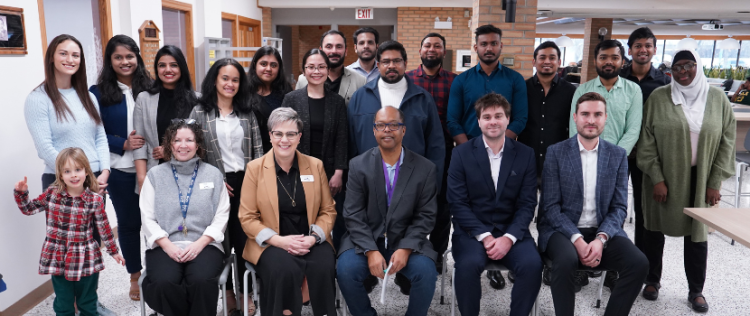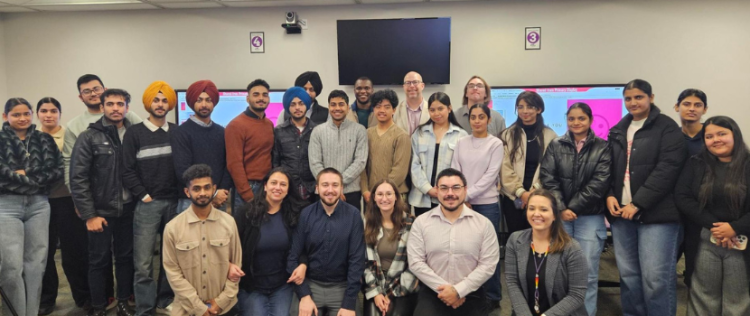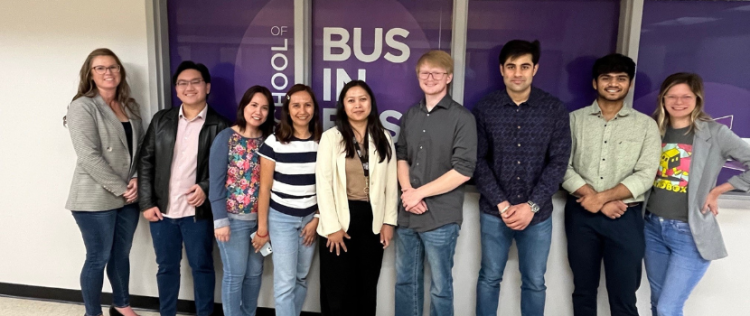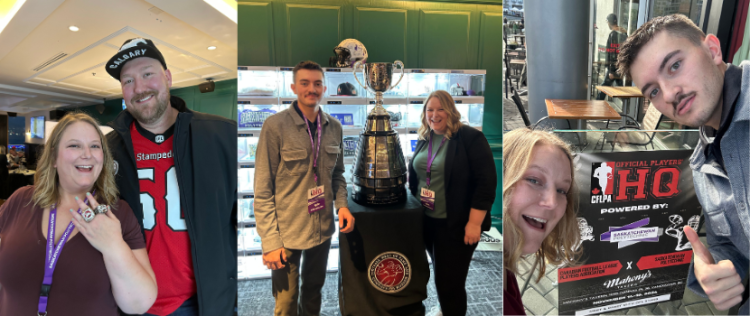One of the great benefits of a polytechnic education is applied learning a method where students take what they learn in the classroom, shop or lab and apply it in a real-world setting or scenario. Instructors at Saskatchewan Polytechnic's School of Business and Entrepreneurship embrace the concept and are expanding opportunities for students to connect their program learning with partner organizations, business and industry before they graduate.
Academic chair Kirsten Downey has been tracking applied learning initiatives in the school and is pleased to see such variety across a wide range of courses. "All of our students should have the chance to take the concepts they learn from their instructors and apply them to see actual results," she says. "There's almost nothing more instructive or rewarding."
Program head Nigel Cooper and a cross-faculty team has been integrating applied projects into his program area and is excited by the result. "My students have been working on entrepreneurial projects to address real-world needs," he says, citing healthcare devices, products for snow removal and an app to help users align interests and personality as examples. "Over the last term they were able to bring together what they'd learned in class and apply their knowledge and entrepreneurial passion to real situations."

At the end of the term, Cooper's students pitched their ideas and supporting work to a panel of judges, including an early-stage angel investor and representatives from RBC, Scotiabank, Snowbank Capital, BDC and Conexus Credit Union. "This gave these learners a better idea of how the entrepreneurial world operates," says Cooper, who notes that some of the resulting projects may have merit for students who wish to pursue them.
Ashley Hatley, who teaches marketing, guided her class on a project initiated by the City of Moose Jaw. "The city reached out to us with a request for market research," she explains, "hoping to gather insights to help attract potential investment in five industries agriculture, aviation, manufacturing, transportation and health care."

Photo credit: City of Moose Jaw
Hatley divided students into groups and assigned them each an industry. "They presented their findings to City of Moose Jaw representatives in early December," reports Hatley, who was struck by the breadth of leaning the experience provided. "The project gave students an in-depth look at economic development opportunities for a real-world sector and then allowed them to practice presenting what they learned in front of an actual client, which was amazing."
Human resources instructor Genelle Payant connected her class with Thunder Creek Rehabilitation Association. Without dedicated human resources expertise, Thunder Creek's job descriptions were out of date. Following a visit from their executive director and director of outpatient services, students took what they learned about the organization and wrote new job descriptions, then used this information to craft job postings. Executive director Chad Topp was pleased with the quality of the students' work, saying, "The ideas and drafts we got from the class helped us to make attractive and enticing postings for positions we hope to fill. We had been using job descriptions as postings, and this project helped us understand how the two are different and what makes for a great job posting."
Payant notes she has done similar exercises with her students in the past but this was the first time working with a real organization. "Knowing they were working with an actual client made it exciting for the students as they knew they had to deliver," she explains, noting that the project also opened the door for future collaboration.
Instructor Megan Moulding's business insurance students had an exciting opportunity to work with local industry organization Saskatchewan Insurance Professionals. Groups of students took turns staging a social media takeover, where they created videos about an insurance-related topic or about themselves and why they chose the field of insurance, then posted them to the organization's Facebook, Instagram and LinkedIn pages. "The students really enjoyed the assignment and used a lot of creativity," shares Moulding, who was able to orchestrate the collaboration through her industry connections with Wawanesa Insurance and Sandbox Mutual.

The results were impressive, with one takeover post generating more than 1,000 impressions and the daily average for all student posts close to 550. "For a small organization, that's real reach," says Moulding. "Besides being a good way for the students to apply their learning," she adds, "it was an excellent opportunity for them to network and introduce themselves to people in the industry."
Another initiative by business instructor Shawna Enns saw students working on a strategic plan report for the Regina Humane Society. "This was a really beneficial exercise," says Enns. "Students were able to apply strategic analysis tools and their newfound knowledge of strategic management to an organization that is doing great things in Regina. Through this project, a classroom full of students are now more aware of who the Regina Humane Society is and how they contribute to the community. Students had many fantastic ideas for how the organization can continue to grow and thrive."
Practicing what you have learned by doing it before entering the workforce full time is key to making connections, notes Downey, who encourages all students in the School of Business and Entrepreneurship to take the chance when it is presented. Some opportunities are part of instructors' curriculum and others are add-on opportunities that require students to apply.
Two such business students specializing in sport management were selected to travel to the 2024 Grey Cup Festival in Vancouver this past November, where they assisted with the Sask Polytech and Canadian Football League's Player Association (CFLPA) partnership activation. Robyn Dutertre and Joshua Grant assisted with event management for a kickoff party where they had the chance to connect with CFL alumni and other Grey Cup attendees. Instructor Chelsea Jones says the opportunity was a first for students in the program, and a great way for them get experience working with a sports organization of that calibre. Dutertre agrees, reflecting on her experience that, "Our trip to work with the CFLPA headquarters deepened our understanding of the sports industry and provided practical insights that will benefit our future. It was a life-changing opportunity!"

In keeping with the school's push for more real-life, experience-based learning opportunities both in and out of the classroom, the School of Business and Entrepreneurship recently launched an Enactus club, focussed on socially responsible community engagement. "This new club, in addition to our existing case clubs, provides students with yet another opportunity to put their learning in action," says Downey.
For more information about applied learning in the School of Business and Entrepreneurship, visit our website at saskpolytech.ca/business.













